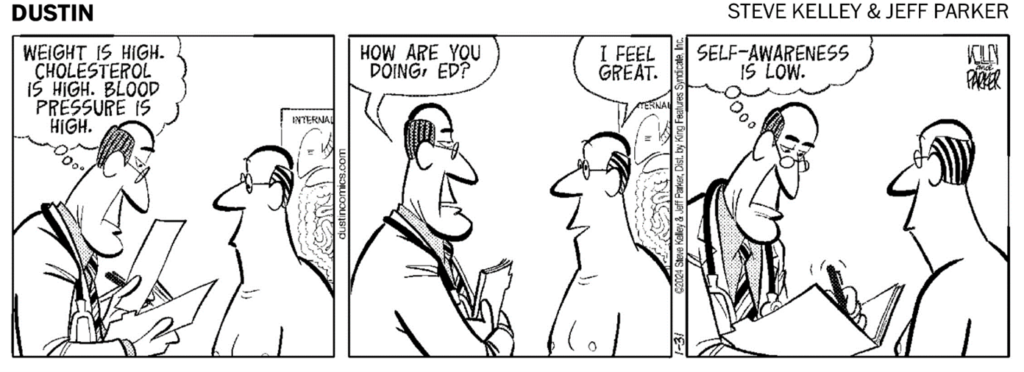I KNOW ME BEST

Some of the saddest things I heard from people I counseled during my 45+ years sitting in the helper’s chair involved what other mental health professionals had said to our about them. It almost always went like this:
“My previous therapist told me I am __________.”
What filled in the blank included:
- categories of severe mental illness (“you’re severely depressed”) to characterological deficits (“you’re a narcissist”);
- accusations of self-deception (“you’re never going to get over this”) to hallucinations (“you’re out of touch with reality”); and,
- personal opinions, including insults (“you’re an idiot to stay with your spouse”) and wild hyperbolic praise (“You are strong! fierce! a beast! the best!”)
But mostly, so-called experts said the clients’ views of themselves were wrong, that the clients’ understandings of their experiences were flawed…that they shouldn’t trust themselves.
The physician in the comic above thinks he knows the patient’s real experience and sees the patient as deceiving himself. Dr. X doesn’t believe his overweight patient with elevated blood pressure and high cholesterol can feel “great.” So, the expert determines the patient lacks self-awareness; the guy on the exam table is wrong. In the doctor’s mind, the patient is actually feeling poorly but is not aware of it.
What often happens next in the exam room is speculation and manipulation disguised as expert knowledge: “You’d feel better if you lost weight” or, “You know you have high blood pressure, right?” (unsaid: “so you can’t be feeling ‘great’…right?”) The judgment remains a thought bubble, but it propels what is spoken. The patient’s actual experience is dismissed because the physician believes it’s wrong.
A Story: When she was about five years old, Allison and I made a trip to see her pediatrician because she was running a fever. Dr. W, a gruff yet playful retired Air Force officer, lifted Allison onto an examination table and asked her to open her mouth so he could examine her throat. After a quick look he said, “Allison, your throat hurts.” She quickly replied, “No, it doesn’t.” The authoritative ex-military officer then said, “Allison, your throat hurts, doesn’t it?” Without hesitation, she said, “Nope.” The doctor’s patience was wearing thin: “Your throat is red, young lady.” Allison replied, “It may be red, but it doesn’t hurt.” I smiled, a proud dad. I think even Dr. W got it at that point!
Here’s the truth, as I see it: No one knows your experience better than you. Period. If someone in an expert role says your perception of your experience is mistaken and theirs is true, run as far from them as you can.
Many licensed medical and mental health professionals are self-deceived because they believe they know your experience better than you, that they know you better than you know yourself. Their interpretations are subjective judgments, but they see their understandings as real and true. They confuse measures (blood pressure) with experience (“I feel great”), conflate categories (“depressed”) with fact (trouble sleeping or getting out of bed in the morning), and promote observation (Dr. W’s “your throat is red and therefore must hurt”) over patient/client self-report (Allison: “it doesn’t hurt”). Your views are dismissed because, well, they assume they have superior knowledge and understanding.
But please hear this: No one knows you like you know you. No one can fully grasp what you’re thinking or feeling. And even if you verbalize your thoughts or describe your emotions to another, they still can’t know what you’re experiencing better than you. Language cannot perfectly describe what you experience. Others’ views/judgments are not more accurate simply because
- they have degrees and licenses
- they watch Dr. Phil
- they read a book about “toxic people”
- they’ve gone through something similar (example: “When I lost my spouse I thought it was grief as well, but my counselor told me I was depressed, and that’s what’s really going on underneath all of this for you.”).
I know some mental health professionals reading this will think I’m wrong; because if I’m right, what they learned in graduate school and how they were trained to think about others is twisted. This challenges their (supposed) superior knowledge and understandings. Well, I could be wrong…but I’m betting on Allison’s perception of her experience or Dr W’s.
When we interact, I know have a viewpoint. And I observe and make sense of what I see and hear. But the final word on what it’s like to live in your skin rests with you.
Remember: “It may be red, but it doesn’t hurt.”
